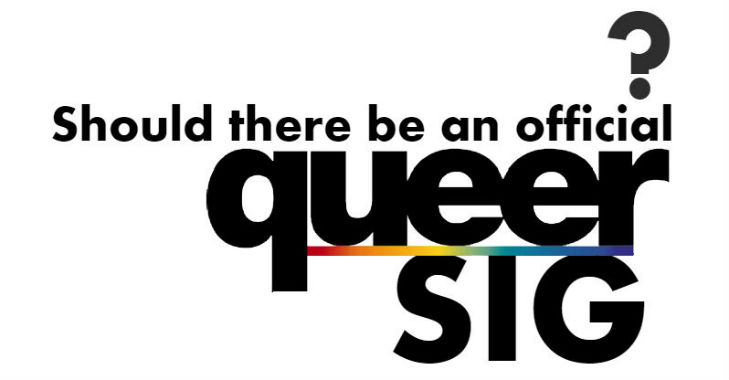An adaptable lesson for #eltfootprint
Someone asked what type of lessons others might use within the environment and sustainable realm of topics, so I whipped one together
Someone asked what type of lessons others might use within the environment and sustainable realm of topics, so I whipped one together
Not only since I’ve been doing talks about LGBTQIA2S community within ELT, but a lot since then, I’ve been asked about the possibility of there being a related teacher association endorsed/organised Special Interest Group (SIG), specifically in IATEFL. For simplicity sake (at least for this post, though there is an argument to be made for or against), I’ll refer to this as Queer SIG (QSIG).
The SIG purpose–not unlike all other SIGs in terms of the special interest itself–would be to have a self-selected grouping together of members interested in and practising queer pedagogies as well as providing a forum, collection of talks, etc., to discuss queer issues within the ELT environment, for example, the practical classroom space, institutional support, teacher training and ongoing development, and policy. As an endorsed official SIG from a teaching association, this usually involves membership money, volunteer hours towards organisation/protocol, and a variety of expectations on providing the above more concretely than say, an informal Facebook group would.
I’ll address a few considerations that come to mind for me here before drawing any conclusions and largely relate this to the IATEFL context as it is the teaching association I belong to.

Hi. Over the last few years, a certain change has been occurring in my belief system, not so much a complete overhaul, but more of an awakening of my ownership of attitudes and actions regarding social issues, and resulting urge to further explore how they impact my pedagogical choices.
 As an ELTer, I’ve never subscribed to the idea that the ELT classroom should be devoid of engagement in social issues nor that we as teachers are meant to act solely as language-checking gurus following a sanitised beige syllabus.Read More »Somewhere in the middle [cross-post]
As an ELTer, I’ve never subscribed to the idea that the ELT classroom should be devoid of engagement in social issues nor that we as teachers are meant to act solely as language-checking gurus following a sanitised beige syllabus.Read More »Somewhere in the middle [cross-post]

It’s been a little while without a post… I’m sorry to myself most of all because writing for 4CinELT merges two important practices for me: academic writing for a wider audience and reflective writing. I need both of these to keep going for my own growth and mental health, frankly. I’m slowly working on a post about my teacher talking time, another about the impact of connecting with learners over the course of a 24-week program, and finally a third regarding professional decisions that can significantly change identity.
Having said this, worthy things have diverted my attention and I’d like to share them because they contribute to these two practices in their own ways. Perhaps one will resonate.

A holiday break for me tends to come with a mixture of unwinding from a demanding term, but also an opportunity to reflect on ELT issues over the past year that have come up. Some of these I’ve just pushed off because of lack of time or desire to bother getting involved in. Others I’ve partly joined a discussion but just gave up because of discourse involved (sometimes platform on which the discussion started). Still there are others that I’ve thought and written about fairly extensively, but begin to reevaluate my position on. These are some thoughts/questions swirling in my head:

One grammar point that comes up again and again in academic writing class is the misuse and overuse of dependent clauses. My students commonly include sentence fragments, forget dependent words i.e. relative pronouns, or attempt overly complex sentences with clause upon clause upon clause. While at higher levels, they know grammatical principles on how to construct them, their application of these principles dissolve in their own writing.
I find it’s valuable to rediscover types of dependent clause construction (and deconstruction) among the class, but it’s also more meaningful when not appearing as its own lesson, but when it stems out of a broader purpose and set of materials. I prefer to break these up into smaller chunks and integrate them into something else I’m doing with the students.Read More »ADJ clauses, student sentences …and Trudeau
Earlier this month I gave a talk entitled The ongoing struggle for LGBTQ inclusivity in ELT at a local conference. I talked about the absence of LGBTQ community in ELT course materials, portrayal when included, reasons and attitudes that contribute to both, and examples of some widely-available resources. The goal was to raise awareness of these areas, and consider how materials design can in some cases unintentionally exclude LGBTQ+ members of the classroom. The premise to the talk included the assumption that those attending were:
One participant at this talk asked me something along these lines: Isn’t discussing gay marriage (or I suppose any of these things) a valid debate to have with students from countries where everything LGBTQ is illegal? Shouldn’t we allow them to discuss their ideas in the safe environment of the language learning classroom?
If you haven’t read Part 1 (setting up assignments together) or Part 2 (explicit connections between disciplines), please do so now.
In this last post of the series, I will discuss the results of this collaboration of assignments with our first-year History professor. In particular, I will address the following: